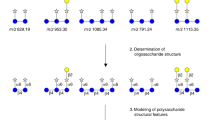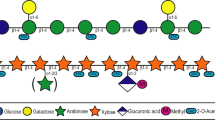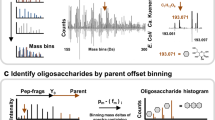Abstract
WE wish to emphasize the usefulness of the method of paper chromatography of sugar1,2, especially when applied on a quantitative basis3, in the study of bacterial metabolism. As an example we quote the following experiment on the utilization of sucrose by Leuconostoc mesenteroides (Lister Institute strain No. 3351).
This is a preview of subscription content, access via your institution
Access options
Subscribe to this journal
Receive 51 print issues and online access
$199.00 per year
only $3.90 per issue
Buy this article
- Purchase on Springer Link
- Instant access to full article PDF
Prices may be subject to local taxes which are calculated during checkout
Similar content being viewed by others

References
Partridge, S. M., Nature, 158, 270 (1946).
Forsyth, W. G. C., Nature, 161, 239 (1948).
Flood, A. E., Hirst, E. L., and Jones, J. K. N., Nature, 160, 86 (1947).
Tarr, A., and Hibbert, H., Can. J. Res., 5, 414 (1931).
Cooper, E., and Preston, J., Biockem. J., 30, 1001 (1936).
Hehre, E., and Sugg, G., J. Exp. Med., 75, 339 (1942).
Author information
Authors and Affiliations
Rights and permissions
About this article
Cite this article
FORSYTH, W., WEBLEY, D. A Method for Studying the Carbohydrate Metabolism of Micro-organisms. Nature 162, 150–151 (1948). https://doi.org/10.1038/162150b0
Issue Date:
DOI: https://doi.org/10.1038/162150b0
This article is cited by
Comments
By submitting a comment you agree to abide by our Terms and Community Guidelines. If you find something abusive or that does not comply with our terms or guidelines please flag it as inappropriate.


